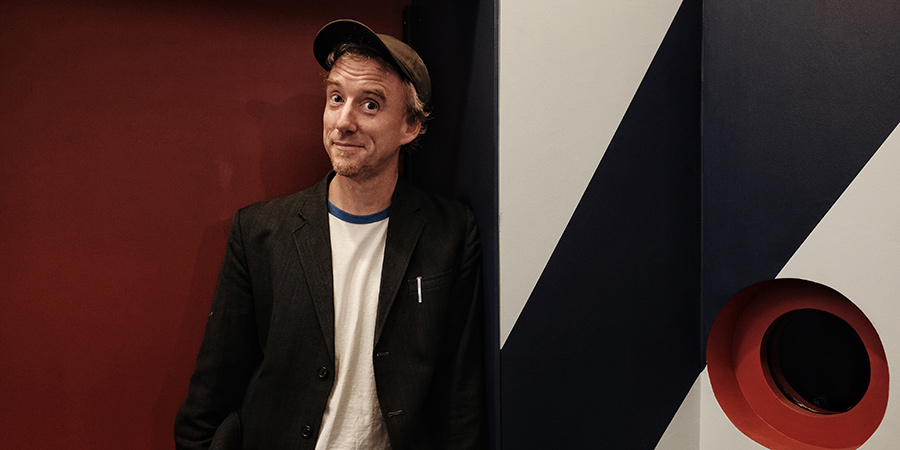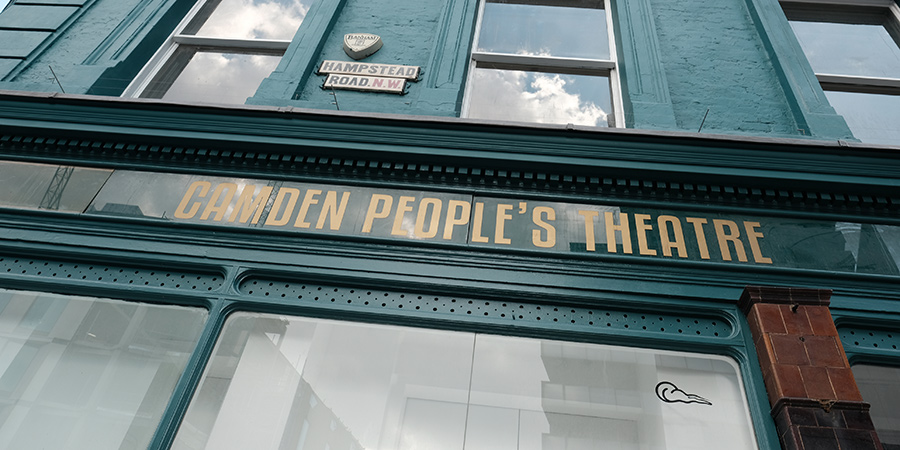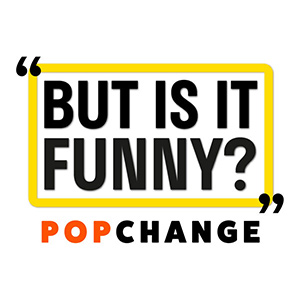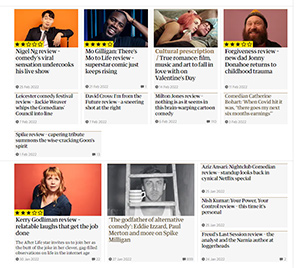Brian Logan on what it's like to be a comedy critic

Brian Logan is one of the UK's most experienced comedy commentators and critics. We talk to him below about how he started his career, the process of reviewing comedy, and But Is It Funny?, the great comedy-focused discussion podcast he co-hosts.
Hi Brian. How did you first get into the world of the arts?
I made some shows at university, then when I graduated, me and some friends set up and co-ran a touring theatre company, Cartoon de Salvo. We were together, sustained by force of will and project funding from the Arts Council, for fifteen years. We made musical / comic / folk theatre and toured it to Edinburgh Fringe, around the UK and beyond.
And throughout that same period, I was writing about the arts, as the assistant theatre editor of Time Out London for a while and for The Guardian and Observer. I started writing about comedy for The Guardian at the Edinburgh Fringe in 2001 and have done it ever since.
What was the motivation behind becoming a journalist and reviewer, and your focus on comedy?
One of my lecturers at Uni of London, the historian Peter Hennessy, propelled me into journalism whether I liked it or not. He got me work experience at The Guardian when I graduated, and I never left. On my first day, I was seconded to the news desk, and had to assist a reporter covering the death by Ecstasy of a schoolgirl in east London. It was so horrifying, and I was so out of my depth, I fled immediately to the arts desk, and there I stayed.
The comedy brief just fell into my lap. There was very little comedy reviewing when I started to work as an arts journalist; in my early years, I wrote much more about theatre. Initially, there was a need at The Guardian for someone to focus on comedy in the Edinburgh festival context, which I was very happy to do. I love the Edinburgh Fringe. Then as the Noughties progressed and comedy boomed, there was the opportunity to cover it more and more - until 'comedy critic' became a year-round activity.

You're also artistic director at Camden People's Theatre. Tell us more about the organisation, and what your role there entails?
CPT is a home for emerging artists, misfit theatre-makers and members of the Camden community that's been operational just west of Euston station for 28 years.My theatre company made our first show there, many years ago.
I've been working there since 2011. As AD, it's my job to develop an artistic vision for the place (i.e. who and what are we for?), and to programme it, and to support young artists who're trying to establish themselves in the field of innovative theatre and performance. And to build bridges between all of that and our local community. And I also co-create and direct my own work there sometimes.

Your latest venture is But Is It Funny?, a podcast for Counterpoints Arts...
But Is It Funny? is as podcast about comedy, and comedy criticism - particularly as considered though a diversity lens. It's a chance to really dig in every week to the issues, and the shows, that everyone's talking about in comedy - but to come at them from angles that might not be getting covered elsewhere.
There are obviously lots of cliches about, and some resistance to, criticising or discussing comedy ("Few people are interested and the frog dies," etc etc). Mainstream comedy criticism is pretty monocultural, and also quite a small scene.
We felt, in dialogue with Counterpoints, which supports and produces the arts by and about migrants and refugees, that there was space for a show that celebrated the discussions and debates comedy can inspire. It's such a popular artform, it's such a touchstone for where the culture is at, and it's so much fun.
So we've cooked up this podcast that gets to grips with everything that happens in the space where comedy and criticism, diversity and social change meet.
We like that you and your co-hosts, Jamal Khadar and Suchandrika Chakrabarti, are not afraid to disagree with each other on air. It's evident you're all very passionate about comedy, and enjoy talking nerdily in-depth about all aspects of the artform. What has been your favourite discussion topics to date?
I enjoyed the chat about Andrew Hankinson's book Don't Applaud, Either Laugh or Don't, about the history of New York's Comedy Cellar. Partly because it took me the whole series to get Jamal and Suchandrika to read the book, also because talking to them about it helped me to reconsider it (and its really meaty subject matter) from totally different vantage points.
I've enjoyed Jamal's evangelism for Munya Chawawa and his work, which has introduced me to great content I might otherwise have missed.
I also enjoyed listening to the team dissect Rose Matafeo's Starstruck the other week, when I was on holiday. But really, I've never not enjoyed these conversations. They made immediately apparent to me how seldom one really gets to drill down into and take apart comedy, criticism and their respective mechanics and assumptions. It's a really invigorating thing to do so, and - with those two co-hosts - always fun and enlightening.
One of the recent episodes featured a section talking about critics appearing on stage. Do you think the fact you're a performer helps when it comes to doing your job as a reviewer?
I think it's helped me, a little bit. But I wouldn't generalise from that: I don't think you need to have been a performer to be a good reviewer. Far from it. But yes, I think it's shaped my insights into (and helped me keep at the front of my mind) the experience of being onstage, how to engage audiences, how it feels to be judged by critics.
Just as thinking and writing about performance in the way you have to do as a critic has fed (for better or worse) into some of the work I've done as a performer and theatre-maker. There are in my life pretty porous lines between the two activities.

Comedy is one of the most subjective things known in culture and it riles people's anger like no other genre does. From On The Buses to Mrs Brown's Boys and Michael McIntyre to Roy Chubby Brown, critics sometimes write-off people and productions despite them clearly being popular with a large audience, and commercially successful?
Yup, I can't deny this does happen. My friend Sam Freidman has written about it in his book Comedy and Distinction: The Cultural Currency of a 'Good' Sense of Humour, in which me, and critics like me, stand accused of being gatekeepers and/or snobs, forever denigrating and excluding popular forms of comedy. I dissent a wee bit from Sam's argument, but it's useful / chastening to keep it somewhere in my mind.
It's not clear cut, though. I wrote an article about Mrs Brown's Boys a few years back that was not at all hostile to the phenomenon. I have no problem being a fan simultaneously of Stewart Lee, say, and Lee Evans.
It certainly is the case though that the more comedy you see, the less patient you're going to become with first-base comedy (in terms of joke construction, say, or topics under discussion). And that's simply because you see so much of it, that its capacity to surprise you (which is a component of making you laugh) is much diminished. So by definition, critics and frequent comedy-watchers will incline towards work that does something new with the artform - because it refreshes our appetite for comedy and gives us something new to puzzle out and write about.
I think you can acknowledge that, and respond to comedy in that way, without being snobby or dismissive of work that's being made more for a popular audience than for the cultural cognoscenti (to the degree that that's a meaningful distinction - and it isn't always.)
How do you ensure you're balanced in your review. i.e. if you hate something, but the rest of the audience around you loved it, or visa versa. Does the star rating reflect your personal opinion in those instances?
Finally, all you've got to go on is your own response. Occasionally it feels appropriate to allude to the audience's response, but usually that's irrelevant. (Sometimes - on press nights etc - they're being incentivised or have been invited to laugh.) The only thing you can trust and stand by is your own response.
That said, because of how cultural conversations have evolved since I started writing about comedy, I do find myself more and more mindful of who any given comedy show is for, and whether or not I am (or am close to) its target audience. And I'll try and express myself with a bit more humility or perspective if it's obvious that a gig isn't really there for people like (white, middle-aged, cis-male) me.
In terms of the star rating (which all critics hate), that does usually reflect my opinion alone - to the degree that such a crude mechanism can do so. Sometimes you find yourself playing off the star rating against the text of the review, or using the review to articulate some nuance that the star rating can't capture. Generally, you write the review, say what you want to say, then go for the star rating that most closely reflects what you've written.

Jamal mentioned one the podcast that he initially only saw the star rating of one of your recent reviews, he didn't read your whole explanation behind that rating...
Most critics can't stand star ratings, because people read the rating and often not the review. If you give a show three stars, for example, you have to accept that many/most people won't bother to read the review. That's painful for critics, because we want to be engaged with on the level of our opinions and how we express them, and not just on the consumer rating we stamp on the thing before publication.
But equally, we're unavoidably part of consumer culture, so you try and make it work. And it can be fun slapping a four- or five-star rating on a review, and knowing that people will then read it, and go see it, and that an artist's life might well get better for a bit as a result of your having done so.
Performers who are the recipients of one and two star reviews have been known to get cross about those reviews. Have you ever had any awkward encounters as a result of a review?
Not really. I knew another critic who got walloped by an artist who'd got a one-star review from him, for a show to which I too gave a (well deserved) one-star review. So I was braced for an awkward encounter there - which never materialised.
Of course I know, as someone whose work has received one- and two-star reviews myself, that it's hurtful, and can often feel unjust. If I'm writing that kind of review, I'll try to do so as un-hurtfully as possible. But yes, give or take the occasional vengeful remark on social media, I've generally been spared awkward real-life encounters.
When writing, you're presumably primarily directing your words at the Guardian readers, but you think about the subject of the review reading your words too then?
I never assume they'll be reading, because there are plenty artists who don't read their reviews - or (I dare say) who don't read my reviews. But yes, I'd always be mindful that they may do so, and of how they might feel if they did. I try and be sensitive to that - although, when I look back on reviews I've written in the past, it doesn't always come across that way. But yes, you're right, the primary audience is people who're reading because they want to know about or experience the show by proxy.
Have you ever really called it wrong and wish you could go back and rewrite a piece?
I can't think of any occasions when I feel, retrospectively, that I made a bad or wrong judgment call. (Although I'm sure I must have done.) I've sometimes expressed myself clumsily, and wished I could re-write, but I don't think I've ever wanted to re-express an opinion wholesale. But usually you're too busy watching or writing about the next show to worry too much about the last one - the newspapers being "tomorrow's chip paper", and all that.
Since you started writing about comedy, the landscape has changed a lot. What has been the most profound changes you've observed?
The biggest change is the one I alluded to above - the massive increase in the size, scale and perceived significance of the whole industry over the first decade of the century. It was amazing to witness and be a little part of. From hardly any touring shows to hundreds of them. From dingy basements to arenas. From 'stand-up doesn't work on TV', to nothing but stand-up on TV. And to a point where what comedians say - the jokes we tell - are considered in the news media as some kind of litmus test of who we are and what's permissible.
Then there's the more recent diversification of comedy and who gets to do it, whereby it's become much less of a white, male hold-out - while acknowledging there's still some way to travel on that score. Obviously we're in an ongoing moment where digital is affecting big changes to comedy, accelerated by the pandemic. But there'll never be any substitute for the live event (ideally not in an arena...).
But Is It Funny? is available on all major podcast platforms.
You can read Brian's articles and reviews in The Guardian
This article is provided for free as part of BCG Pro.
Subscribe now for exclusive features, insight, learning materials, opportunities and other tools for the British comedy industry.


